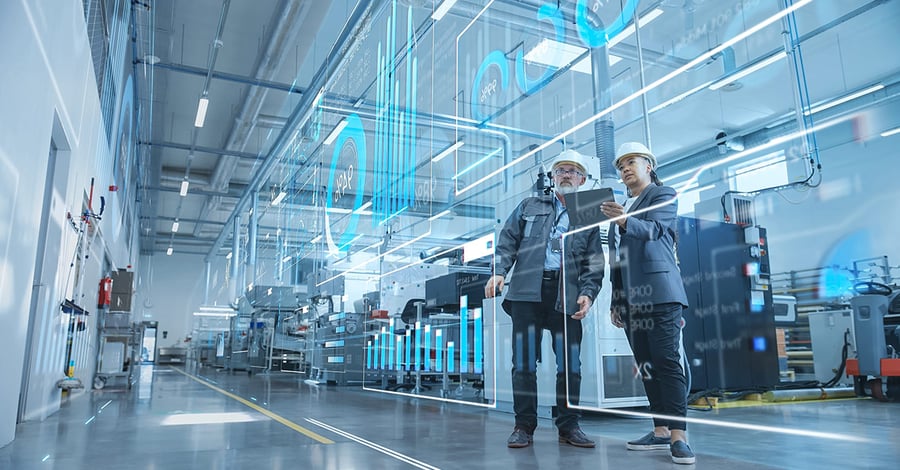The global Enterprise Resource Planning Software market is expected to achieve a revenue milestone of US$52.33 billion in 2024. Following this, an annual growth rate of 4.48% is anticipated over the period from 2024 to 2028, leading to a projected market volume of US$62.36 billion by 2028. The expansion of the ERP software market is driven by several key factors, including the escalating demand for efficiency and transparency in business operations, a growing preference for data-driven decisions, and the increasing adoption of mobile and cloud applications.
The manufacturing and services sector has consistently held the largest share of the ERP software market, accounting for over 20% in 2022. This underscores the critical role of ERP systems in streamlining operations and enhancing efficiency within these industries.
Given the expanding ERP market, this comprehensive guide is tailored for mid-sized enterprises. You will discover strategic insights and practical tips on leveraging ERP systems to navigate the complexities of today's market. This guide will equip your business to harness growth and enhance operational effectiveness in the evolving landscape.
Mid-sized enterprises operate in a unique space. They are ambitious enough to dream big but often grapple with resource constraints that larger corporations might not face. This challenging landscape requires a solution that's not only robust but also flexible and affordable. ERP systems serve as strategic partners in this endeavor, offering a mix of functionality and scalability tailored to mid-sized industry requirements.
Essential Elements of ERP for Mid-Sized Enterprises:
- Integrated Supply Chain Management: Your ERP system should unify all segments of the supply chain, from sourcing materials to delivering products, enabling your business to achieve seamless coordination and gain instant visibility across the entire network.
- Shop Floor Management: The system provides functionalities such as scheduling production, managing resources, handling work orders, and monitoring machinery. These features empower you to enhance your shop floor operations, boosting productivity and efficiency.
- Inventory Optimization: Managing inventory against variable demand is a key challenge. ERPs for manufacturing industries utilize advanced forecasting and demand planning tools to fine-tune inventory levels, helping you minimize costs and meet demand efficiently.
- Quality Control: Upholding high standards of product quality is essential. An ERP for manufacturing industry with a quality management module allows your company to implement stringent quality checks, track issues, and take corrective actions promptly, ensuring product excellence.
- Regulatory Adherence: Staying compliant with industry regulations is a constant endeavor. An ERP system, such as Ramco, equipped with compliance functionalities streamlines the process of regulatory reporting and ensures that your business meets all legal obligations.
- Financial Insights: Integrating financial management within your ERP for manufacturing systems offers a holistic view of your financial health and operational effectiveness. This integration is vital for keeping track of your company's performance, encompassing everything from expense tracking and budget management to financial reporting, providing you with the tools necessary to navigate financial complexities.

Selecting the Ideal ERP System for Your Business
While choosing an ERP solution to manage your complex operations, there are several critical considerations to keep in mind:
- Scalability: The ERP system you select must have the capacity to scale with your business's growth, ensuring that expansion can be accommodated seamlessly without major operational disruptions.
- Customization: Off-the-shelf ERP for manufacturing solutions provides basic functionalities, but the real value lies in customizing the system to fit your specific business needs. It's crucial to find a solution that can be tailored to support your unique processes. The expertise of ERP providers in your domain should not be underestimated. For example, if your business is in the cement sector, a provider like Ramco ERP, with over 35 years of industry experience, might be an ideal choice.
- Integration Capabilities: The ERP for manufacturing solutions should integrate effortlessly with your existing systems and any third-party applications to maintain data consistency and improve workflow efficiency. While your business might utilize various systems for different functions, centralizing information tracking through a unified ERP system is key to obtaining a holistic operational overview.
- User Experience: An ERP system should have an intuitive interface and be user-friendly to ensure it is quickly adopted by your team and maximizes user engagement across your organization.
- Vendor Support and Training: Choosing an ERP vendor that offers dependable support and comprehensive training programs is essential. This ensures that your team can fully utilize the ERP system and tap into its extensive capabilities.
By focusing on these areas, you'll be well-equipped to choose an ERP solution that not only meets your current needs but also supports your business as it evolves.
Advantages of ERP for Mid-Sized Enterprises
Adopting an ERP system that's specifically designed for the complexities of mid-sized manufacturing businesses offers numerous advantages:
- Streamlining Your Operations: ERP systems centralize your data and automate routine processes, effectively removing operational inefficiencies and bottlenecks. This consolidation leads to smoother operations and a noticeable boost in productivity.
- Gaining Enhanced Visibility: Having real-time access to critical data points, such as inventory levels, production schedules, and financial metrics, empowers you to make data-driven decisions and plan strategically for the future.
- Achieving Cost Reduction: Through the optimization of inventory management, shortening of lead times, and reduction of waste, ERP for manufacturing systems helps you achieve significant cost savings across various operational areas.
- Elevating Customer Satisfaction: Improved management of inventory and more accurate processing of orders allow you to fulfill customer demands more efficiently, resulting in faster delivery times and higher customer satisfaction levels.
- Ensuring Compliance and Managing Risks: ERP systems equipped with compliance management features assist you in navigating the complexities of regulatory adherence and quality control, thereby mitigating risks related to non-compliance and product quality issues.
For mid-sized enterprises, investing in a tailored ERP solution to address their unique operational challenges is not just beneficial—it's crucial for fostering sustainable growth and maintaining a competitive edge. By embracing the right ERP system, your business can streamline its processes, improve operational efficiency, and adapt more effectively to the dynamic demands of the manufacturing industry.
Conclusion: Why ERP is a Game-Changer for Mid-Sized Enterprises
Mid-sized enterprises need to stay agile and ahead of the curve. Implementing a tailored ERP for Manufacturing is not just advantageous; it's essential for sustainable growth and success. As you navigate the complexities of your industry, let an ERP system be your guide to streamlined processes, enhanced operational efficiency, budget optimization, and a robust framework for data-driven decision-making.
Are you ready to transform your mid-sized enterprise with a tailored ERP solution? Embrace the future of manufacturing with a system designed for your specific needs and budget. Reach out to explore how Ramco ERP solution can empower your business in today's competitive market. Your journey towards data-driven excellence and financial prudence starts here!



